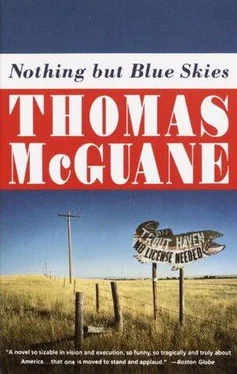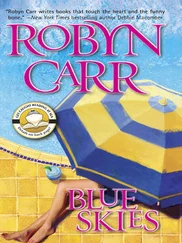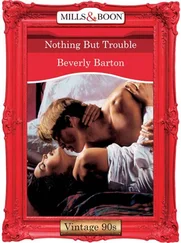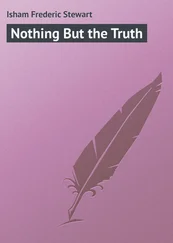Frank regretted that Lucy had such a time getting out of the car gracefully, the white awkwardness of her buttocks emerging from the door, her right foot pedaling toward the ground. Unable to pull up his pants because he was standing on his own cuffs, Frank did little better. A couple of creeps, he thought.
They went on down the alley to where it opened up into a small park. Lucy was silently weeping. He could reach up in the dark and feel the cold, drizzling tears. There was not one thing he could say or had any right to say. Tears began to pour from his own eyes. What was this? He took Lucy into his arms in such a way that she could feel these tears of his, until a kind of easy solitude let them laugh rueful snot bubbles from their noses. Pretty soon they were laughing. At first they tried to laugh quietly. Then Frank tried loud laughter. So did Lucy. They began to guffaw like two people in an opera. It was literally, “HA, HA, HA!” They were bellowing. They were having fun at last.
Frank walked Lucy to her car. It was parked a block behind Main Street and he could read the names of the old businesses: grocers, hardware merchants, even a blacksmith. The stores in front had long since become something else: florists, clothiers, boutiques, office supplies.
“What is this?” he asked her.
“A Toyota Corolla.”
“Is it any good?”
“Yeah, it’s fine. Well, Frank —”
“Lucy.”
“I enjoyed it.”
“So did I.”
“Nice big laugh there at the end.”
“You can say that again,” said Frank.
“Nice big laugh there at the end.”
“Good, Lucy.”
“I’ll see you at the office.”
“See you at the office.”
Frank liked to think he occupied some middle ground between his father and his grandfather. His father had been an Eagle Scout and a good scholar. He had also had a fanatical desire to better himself financially, a personal pride in the score, not unlike the athlete bent on achieving a four-minute mile, a thousand-yard season. Frank’s grandfather was a dour farmer who rarely said much but seemed to take in everything with his great stern eyes. When Frank’s father had first made money to any degree, he took Frank, then nine years old, and his father to the country club for dinner. He made everyone eat a lobster. He drank far too much and stuffed crumpled bills into the waitress’s hand. Frank’s grandfather watched this in silence, then finally boomed out over the lobster shells, “If you can’t drink any better than that, Bill, you had better not drink at all.”
The whole country club heard it. Frank saw his father’s sudden, startling vulnerability, saw both his face and his pride fall at one time and understood the astonishing power of deflation fathers have over their sons. In a way, it made Frank happy not to have a son, on the slim chance he could ever accidentally use this terrible weapon, this atom bomb. He was having the opposite problem with his daughter: he daren’t say a word against the one with the nose ring for fear of receiving a good lecture. Or the head of the citizens’ group, who wished to save Montana for Montanans. He could only learn to feel something was missing from his life, not having a nose ring of his own, a butterfly tattooed on his butt.
On Monday he did not go to work at all. This had almost never happened before. And instead of asking Eileen to hold the fort, he called early in the morning and told her to take the day off too.
She was delighted and said she would go to Helena to watch minor league baseball. “Thank you, Mr. Copenhaver. I’ll be there bright and early tomorrow morning.”
“As you wish, Eileen.”
“Can I ask where you’re going?”
“I’m looking for a mental health professional within comfortable driving distance.”
There was a long pause and then Eileen said in beefy, almost British tones, “I’m going to take a chance here, Mr. Copenhaver, and assume that you are serious. I’m going to tell you that I think that that is a very good idea. I hope you realize that it’s nothing to be ashamed of.”
“I do, Eileen,” Frank said thinly. In fact, he had already made an appointment with a therapist. He was looking at the picture of a movie star in People magazine who was attending a Crow Indian sun dance ceremony, hanging by thongs through his chest from the lodge poles of a prodigious tepee.
A short time later, it seemed to make sense for Frank to stand inconspicuously in the parking lot behind Mullhaven Hardware, watching people park their cars. His eyes were covert slits. An old rancher came in, parked his big Toronado, with its pink and white paint job, and climbed out pocketing his keys. A heavy red-haired woman in jogging pants arrived in a green Wagoneer, thrust the keys under the seat and got out. A man who looked slightly costumed in his gardening clothes drove up in a white Ford station wagon and went inside without making any special movements toward the ashtray, the visor or beneath the seat. When he was out of sight, Frank went to the car and got in.
The keys were in it. There was a crisp, unopened Wall Street Journal on the seat and Frank took a moment to glance at the headlines. The Fed had cut the interest rates again but it was not expected to impact the recession. He started the car and backed out of the angled slot into the alley. He swung around to Main and turned east, enjoying the commodious volume of space behind, thinking of it filled with kids’ bicycles or fitted with a dog barricade or redolent of a well-used rotary mower, green polished off at the corners to a pewter gleam under its veil of 30-weight oil. Unfortunately, it was a brand-new shell of a station wagon and had the familiar, disconcerting, prop-like quality of the unearthly exercise equipment that freighted the yard sales of America.
That feeling went right away as he tooled over the pass, eyeing the various gougings of the nearby mountainsides and looking forward to the prospect of pouring his guts out to a stranger. Then quite suddenly he lost all sense of what he was doing in this car and began checking in the rearview mirror for the police, staring between the retreating twin columns of mountainside reflected down toward his eyes, then scanning the silver-gray bands of pavement and the spheres of white clouds on a dome of blue sky: no cops. The fear passed and he resumed his confident occupancy of the station wagon, custodian of the deeply throbbing wheel and air-light accelerator as the pass opened to the shallow plains of cattle pastures.
It was then that he spotted the cellular phone. It seemed comforting, as if a car thief would scarcely drive the speed limit and make a few telephone calls. First he called Lucy at her office. “I’ve been looking for you,” she said, “and you didn’t come in today.” She didn’t sound hurt, nor did she seem reticent about looking for him.
“I’m trying to make some adjustments, Lu.”
“Who isn’t, Frank? Are you coming in today?”
“I don’t think so.”
“Well, let me get something off my chest then.”
Frank thought about her chest, the receptive undercurve of her resting bosom. A wonderful homey thing that helped pass the time. “Fire away, Lu.”
“Frank, I don’t think these ‘episodes’ are good for me.”
“No?” He pictured the Buick’s interior, the upended Lucy with a whelk curve of open pink flesh.
“No. Sure, there’s pleasure. But just now they make my, uhm, plight seem more extreme, and it lasts longer than the pleasure. I’ve been noticing that.”
“Aw, Lu.” That sounded unhelpful, but he couldn’t touch the white whale of a subject that buried everyone just now, the deep distaste men and women had for each other of late, the unstable truces of the new marriages, the warlike affairs. Frank hoped they had bypassed that with an avalanche of sheer lewdness, but it was just wishful thinking. Indelicacy was not a cure for everything.
Читать дальше












